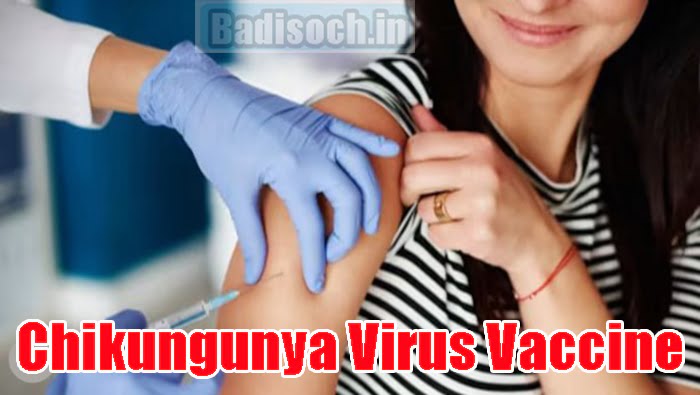Chikungunya Virus Vaccine- The Valneva vaccine, sometimes referred to as Ixchiq, was shown to elicit antibody levels that could neutralise the virus in 98.9% of participants for 28 days post-vaccination, making it the first chikungunya vaccine to receive regulatory clearance. Patients from Colombia and Panama are anticipated for Bharat Biotech International’s Phase 2/3 chikungunya vaccine study, which is now taking place in Costa Rica. In 98.5% of participants, Valneva’s vaccine candidate has generated neutralising antibodies.
The United States has authorised the first-ever chikungunya vaccine, marking a “huge leap forward” in the fight against the crippling disease spread by mosquitoes. A single-dose injection created by the European company Valneva has received approval from the US Food and Drug Administration (FDA) to be used in those 18 years of age and older who are more susceptible to catching the dengue-like virus. Prof. Peter Marks, head of the FDA’s Centre for Biologics Evaluation and Research, said, “[The] approval addresses an unmet medical need and is an important advancement in the prevention of a potentially debilitating disease with limited treatment options.”
Chikungunya Virus Vaccine
Chikungunya, named after the Makonde people of Mozambique and Tanzania, is a mosquito-borne viral illness that causes fever, joint pain, muscle discomfort, joint swelling, headache, nausea, exhaustion, and rash. Usually, severe joint pain that lasts for weeks or even years is the cause of this. The tests will be conducted at nine clinical trial sites, including those in Guatemala, Costa Rica, Panama, Columbia, Thailand, and other nations where chikungunya is widespread. The Phase 2/3 clinical study in Costa Rica, supported by the India Centric Epidemic Preparedness Mission and CEPI, assesses the safety and immunological response of Bharat Biotech’s BBV87 vaccine candidate in healthy people.
The term “chikungunya,” which originates from the Kimakonde language prevalent in some regions of east Africa, means “to become contorted.” It was discovered in Tanzania in 1952 and caused the first outbreaks that were officially recorded in cities in Thailand and India some 15 years later. Diagnoses can be complicated by the disease’s comparable symptoms to dengue and Zika, which include fever, excruciating joint pain and swelling, headaches, exhaustion, and rash. The disease is also carried by the same insect. Though there are presently no medicines that explicitly target the infection, it is seldom fatal—350 individuals died out of the approximately 440,000 cases documented as of September.
Chikungunya Virus Vaccine Details
| Article Name | Chikungunya Virus Vaccine |
| Category | News |
| Official Website | Click Here |
 |
|
| Telegram |
Which injection is used for chikungunya?
Chikungunya is a viral disease that currently has no vaccine or specific treatment. However, certain measures can be taken to alleviate the symptoms of the disease. Rest and consumption of fluids are essential in managing the symptoms of chikungunya. Over-the-counter pain relief medications such as acetaminophen (Tylenol®) or paracetamol can help reduce fever and pain associated with the disease. As there is no cure for chikungunya, prevention is key. Protecting oneself from mosquito bites by using insect repellents, wearing protective clothing, and avoiding areas with stagnant water where mosquitoes breed can help reduce the risk of getting infected with this illness.
How long does chikungunya vaccine last?
The VLP vaccine candidate has shown promising results in both non-endemic and endemic regions during first-in-human and phase 2 studies. The vaccine was well-tolerated by participants and demonstrated immunogenicity after two vaccinations, triggering a strong serum neutralizing antibody immune response that lasted up to two years. These results bode well for the development of an effective vaccine against the target disease, which could have a significant impact on public health. Further research is necessary to determine the long-term efficacy of the vaccine and its potential for widespread use.
Check here- August Supermoon 2023: When and Where to Watch?
Chikungunya Disease
At least 5 million cases of the mosquito-transmitted illness chikungunya have been reported in the last 15 years, raising concerns for world health. All genders and age groups are affected by the symptoms, which include fever, viremia, joint discomfort, and maculopapular rash.
In previous studies, the condition persisted in more than half of the patients and resulted in crippling polyarthritis.9. The estimated case-fatality ratio is 0·3–1 per 1000, and the bulk of recorded deaths occur in persons with underlying medical conditions, newborns, and elderly people.
Historically, the best method for safeguarding people and curing infectious illnesses has been vaccination. Humans and animal models have demonstrated safe immune responses to recent Chikungunya vaccines.
Diagnosing Chikungunya Virus
See a medical practitioner if you have any of the above symptoms and have been in an area where the chikungunya virus has been identified.
Tell your doctor about the dates and locations of your travels.
Your healthcare provider may recommend blood tests to check for Zika, dengue, or chikungunya, among other related infections.
Click Post- Reliance SBI Credit Cards: Fee & Limits, Benefits
Vaccine Test
Phase 3 clinical studies are evaluating Valneva’s VLA1553, a weakened live virus vaccine candidate that may not be appropriate for pregnant women or those with compromised immune systems.
4,115 healthy people from around the United States took part in this new study. Seventy-five percent of the participants got a single dosage of VLA1553, while the remaining ones were given a placebo.
According to the Lancet research, the vaccination caused mild to severe side effects, such as headaches, tiredness, muscle or joint discomfort, and injection site pain, but overall, it was well accepted across all age groups.
Mild muscular soreness and fever were among the serious adverse events that happened to 1% of people exposed to placebo and 2% of persons exposed to VLA1553, although none of them were fatal.
Immune Response
Both innate and adaptive immunity are necessary for defence against pathogen infections. Patients infected with CHIKV have higher levels of IFN-α due to the type-I IFN responses induced by alphaviruses. Innate immune responses are triggered by antigen-presenting cells such as dendritic cells, macrophages, and Langerhans.
Both innate and adaptive immunity are necessary for defence against pathogen infections. Patients infected with CHIKV have higher levels of IFN-α due to the type-I IFN responses induced by alphaviruses. Innate immune responses are triggered by antigen-presenting cells such as dendritic cells, macrophages, and Langerhans.
Read Here- Samudrayaan Mission: Launch Date, Launched By
Vaccination Therapy
The single-dose “Ixchiq” vaccine from Valneva Austria GmbH is approved for use in adults who are at a higher risk of contracting the virus. Ixchiq was placed in breakthrough and expedited therapy.
Even though there have only been at least 5 million occurrences of severe diseases and fatalities in the last 15 years, medical professionals believe that this is a growing hazard to world health that is made worse by climate change.
In 99% of those tested, neutralising antibodies against the chikungunya virus were found at a level thought to protect against illness 28 days following a single injection.
Is there any vaccine for chikungunya?
The Food and Drug Administration recently approved a vaccine called Ixchiq for the chikungunya virus, marking the first time such a vaccine has been licensed. Chikungunya is a mosquito-borne disease that causes fever and severe joint pain, with symptoms lasting for months or even years. The approval of this vaccine provides hope for prevention and control of this virus, particularly in areas where it is endemic.
Chikungunya Virus Symptoms
Symptoms of the Chikungunya virus, which include fever, joint pain, headache, muscular soreness, swelling, or rash, usually appear 3–7 days following a mosquito bite.It is uncommon for chikungunya to be fatal.
Those who are sick, elderly, or babies are considered severe instances. Joint discomfort might last for a while, although most people get better after a week.
Check Post- Bank Aadhaar Seeding Status @ uidai.gov.in
Consumers Statistics who pay for Vaccine
We spoke with 496 people.Of them, twenty-three were left out of the analysis. The majority of respondents—57.3% of whom were female—had private health insurance (62.6%), were employed (87.7%), and at least had a high school education (90.7%).
The WTP’s median value for a vaccine administered once was US$ 31.17 (120.00 BRL).There was a statistically significant correlation between the WTP and monthly family income as well as the presence of private health insurance.
Chikungunya Virus Vaccination Price
The cost of the Chikungunya vaccine has not yet been appropriately revealed. However, it will be available shortly.
Conclusion
Chikungunya virus is a mosquito-borne illness that has become a growing concern in recent years. It causes fever, joint pain, and muscle aches, and in some cases, can lead to long-term complications. As researchers continue to study and understand this virus, the development of a Chikungunya virus vaccine has become a top priority. Scientists are working diligently to develop a safe and effective vaccine that can provide protection against this debilitating disease. The goal is to create a vaccine that not only prevents infection but also reduces the severity of symptoms in those who do contract the virus. While there is currently no approved vaccine available, progress is being made, and it is hoped that in the near future, individuals at risk for Chikungunya virus will have access to a vaccine that can help prevent its spread and protect their health.
Chikungunya Virus Vaccine FAQ’S
Is there any vaccine for chikungunya?
Ixchiq, the first chikungunya vaccine, was authorised by the US Food and Drug Administration today. For those who are 18 years of age or older and are more likely to contract the chikungunya virus, Ixchiq is authorised.
Which injection is used for chikungunya?
As of right now, there is no medication to cure or vaccination to prevent chikungunya. Certain symptoms may be relieved by rest, water, and over-the-counter painkillers. To lower temperature and discomfort, take medication such as paracetamol or acetaminophen (Tylenol®).
What is the new treatment for chikungunya?
Although there isn't a particular antiviral therapy for chikungunya, several therapeutic alternatives are being researched. Analgesics and antipyretics, as well as rest and drinks, can all be used to treat symptoms. Pain and fever that is acute can be treated with nonsteroidal anti-inflammatory medications.
How long does chikungunya vaccine last?
The VLP vaccine candidate is well-tolerated and immunogenic after two injections, eliciting a robust serum neutralising antibody immunological response that can last for up to two years, according to first-in-human and phase 2 studies conducted in both endemic and non-endemic locations.
Related Posts:-
Cyclone Biporjoy Update, Live Location, Speed
EMS IPO GMP Today, Price, GMP, Review, Analysis
